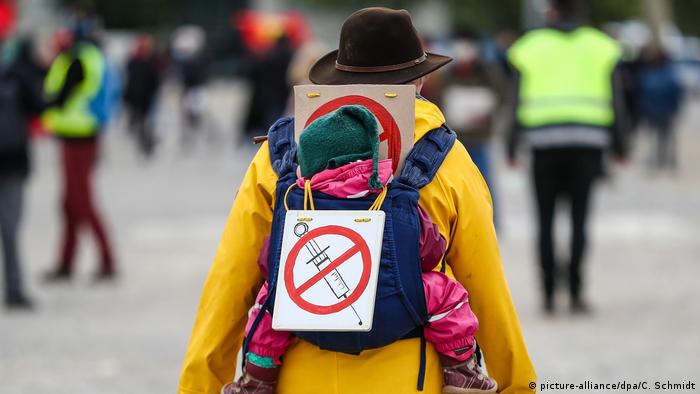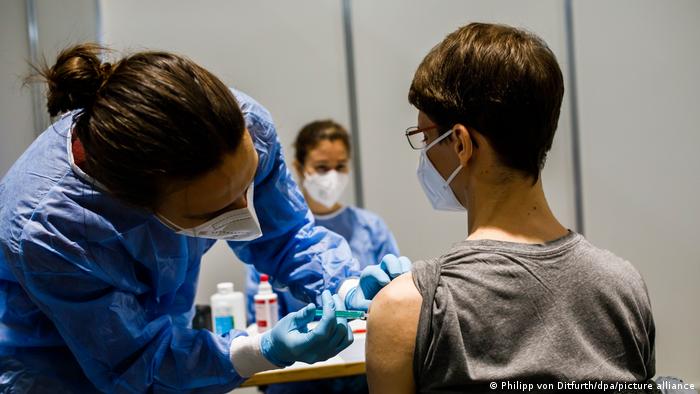COVID-deniers and anti-vaxxers threaten German doctors
German doctors are increasingly reporting that they have been receiving abuse in their clinics and threats of violence by mail from anti-vaxxers across the country.
A number of doctors’ organizations contacted by DW this week reported an aggressive atmosphere and frayed nerves in many German clinics.
This comes as the coronavirus pandemic reaches unprecedented infection ratesin the country: On Thursday, Germany reported the highest number of new cases of any country in the world, with 50,377.
One of the most concerning reports came from the eastern state of Saxony, where the 7-day incidence rate of new infections is highest (569 per 100,000 inhabitants) and the vaccine uptake rate is lowest (only 57% of the Saxony population are fully vaccinated). Across Germany, 70% of the population is currently vaccinated.
“The aggression and extremism among people has become significantly worse,” said Erik Bodendieck, chairman of the Saxony Medical Association and himself a general practitioner. “Some doctors have even received death threats.”
Bodendieck said he has become used to receiving threats himself because of his public role as the association head. “These are emails where I get attacked personally, where I get threatened with legal action,” he told DW. “And there are letters where it says things like: ‘You all belong in front of a firing squad.’ That kind of thing.”
“Yesterday I called for mandatory vaccines, and despite all the approval on social media, I’m sure the vaccine opponents will be up in arms again,” Bodendieck added, before saying he feared that some doctors in Saxony may even decide not to administer COVID vaccines, partly because of the threats.
Harsher tone among patients, nerves frayed among staff
Ulrike Schramm-Häder, the spokeswoman for the Thuringia Medical Association, said 25 doctors had reported receiving threatening letters. “The letters mainly say that the vaccinations are dangerous and accuse the doctors of carrying out human experiments,” she told DW.
Schramm-Häder, who herself received such a letter even though she doesn’t administer vaccines, said that the writers occasionally veer into conspiracy theory territory: There is talk of shadowy forces controlling the federal government, “but there are also people who simply reject all measures meant to protect against coronavirus. And they do put some effort in: They research doctors’ names and addresses.”
But it is not only about anonymous hate mail. The day-to-day atmosphere in many clinics has become strained. The Thuringia Medical Association held a conference in September where several doctors reported encounters with angry patients in their clinics. “Sometimes the patients react very aggressively to normal questions, such as about their vaccination status. That’s just something doctors need to know,” said Schramm-Häder.
Some doctors choose to press charges or pass on threatening letters to the police; others simply discard the messages. Like many medical associations in Germany, the Thuringia association released a statement condemning the behavior, emphasizing the importance of coronavirus measures, and saying that doctors are responsible for the health of their employees and other patients waiting in the waiting room.
Undeterred by aggression and threats
Few of the medical associations contacted by DW have collected concrete figures about the number of threats, but many, like Berlin and Lower Saxony, have noticed a harsher tone from patients. Pandemic fatigue, both among patients and staff, is setting in, a spokesman for the Berlin state Medical Association said: “Nerves are frayed on both sides.”
Berlin was the scene of one of the more drastic cases in October, when a clinic that was administering vaccines was forced to close down for several days and hire private security because the anonymous threats were deemed so serious. The association said that the identity of the clinic was being kept secret and the doctors did not want to comment publicly to prevent further escalation.
The threats have become routine, especially for doctors who actively promote vaccines on social media. Thomas Spieker, spokesman for the Lower Saxony Medical Association, says front-line medical staff have to bear the brunt of the increasingly emotive public debate about coronavirus measures and vaccines — and that is straining the health care system in general.
“Sometimes people call into clinics and seem to mistake the doctor for a policymaker,” he told DW. “Every day since the beginning of the pandemic, doctors and their staff have stood in the crossfire, risking their own health. Of course, that also obstructs how other illnesses are being treated.”
But Wolfgang Kreischer, chairman of the Berlin and Brandenburg association of general practitioners, is undeterred. He, too, has received anonymous threatening letters and had unpleasant experiences at work, with one patient saying “she hoped we would all be punished” for offering vaccines.
Kreischer has also noticed patients coming in to get vaccines because they feel they’re forced to do so, and then becoming tetchy about it: “They don’t want any information about the vaccines; they just want to get the vaccine and go, and you can tell they’re just doing it now because of the pressure,” he said.
He also knows of a case of one doctor who has stopped administering vaccines because her office stamp was forged and used fraudulently in vaccine documents. “Every time she gets a report about the stamp being used she has to give a statement to the police,” he said. “It’s become too much work for her.”
But despite the threats, Kreischer insists that he and his team remained “very motivated” and plan to continue the vaccinations.
“Most patients are very thankful to get the shot,” he said.
While you’re here: Every Tuesday, DW editors round up what is happening in German politics and society. You can sign up here for the weekly email newsletter Berlin Briefing, to stay on top of developments as Germany enters the post-Merkel era.




